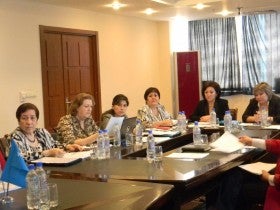Integration of gender perspectives to prevent and respond to emergencies was discussed in the Round table meeting in Tajikistan
Date:
Dushanbe, Tajikistan, 12 April 2012 - Importance of gender-sensitive management of natural disasters in Tajikistan was discussed today in the round table, organized jointly by the Committee of Women and Family Affairs, UN Women and UNDP. The event was aimed at defining strategies on how to better address gender needs before, during and after disasters and developing a set of action-oriented recommendations for the Action Plan of the National Strategy on Activating the Role of Women in Tajikistan 2011-2020.
The evidences show that there is a pattern of gender differentials at all levels of the disaster management process such as exposure to risk, risk perception, physical and psychological impact, preparedness, response, recovery and reconstruction. In other words, men and women suffer from consequences of disasters in different ways and often time women are more vulnerable to disasters.
The participants of the meeting discussed the need to mainstream gender in disaster risk management processes, how to prepare and respond to emergencies from the perspective of gender policies and collected views of the main actors on gender politics in Tajikistan in the field of disasters risks management.
For more information, please contact:
Muhabbat Yakubova
UN Women Communication Specialist
E-mail: [ Click to reveal ]
Anvar Sabzaliev
Early Recovery Programme Officer
Disaster Risk Management Programme, UNDP Tajikistan
E-mail: [ Click to reveal ]
“Engagement of a larger group of stakeholders in planning and implementation of gender-sensitive interventions in disaster risk reduction will help during emergency situations and will minimize possible gaps and overlapping in DRR efforts,” says Ms. Shahlo Rahimova, Manager of UNDP’s Disaster Risk Management Programme (DRMP).
The round-table was organized under the auspices of UNDP Tajikistan and within the frame of the “Capacity building for mitigating climate change induced disaster risks” project, implemented by UNDP as part of a larger Disaster Risk Management Programme (DRMP) to address the issues of disaster preparedness, response, recovery and risk reduction in Tajikistan in close cooperation with the Committee of Emergency Situations and Civil Defence (CoES).
“We are happy that we will be able to implement gender-sensitive interventions in disaster risk reduction activities and we hope that our cooperation will be a great benefit to people of Tajikistan. We look forward to seeing fruitful results in the nearest future,” added Viloyat Mirzoeva, UN Women Portfolio Manager.
At the outcomes of the meeting, the participants determined future steps in implementation of gender-sensitive intervention in disaster management and developed preliminary recommendations for the integration of gender perspectives in the management of emergencies that will be included in the Action Plan to enhance the role of women in Tajikistan.

